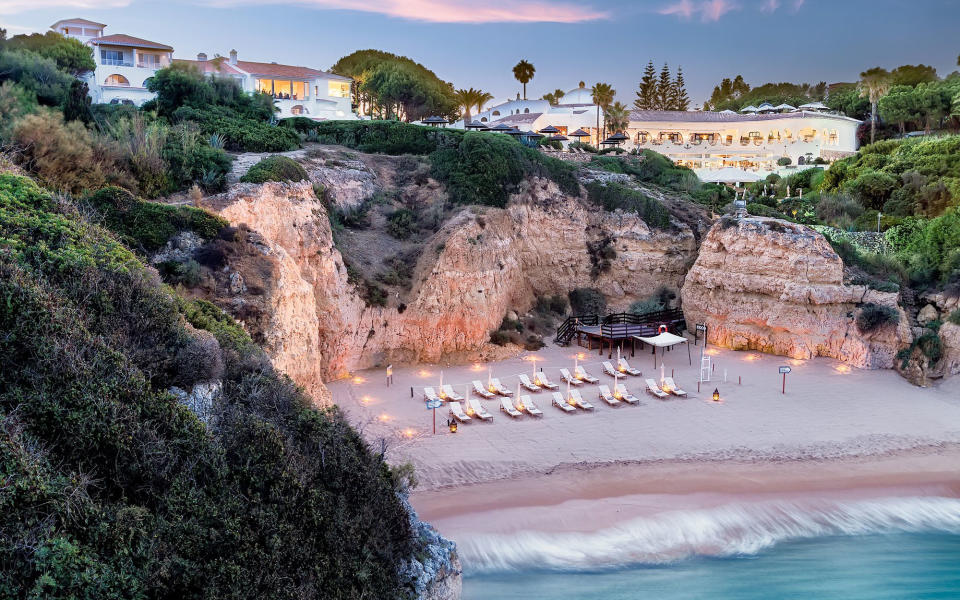Is the Algarve ready for us? Dispatch from the ground as Portugal stirs

The nearly seven week lockdown that the Portuguese government imposed on its citizens from March 19 until May 4 when the State of Emergency became downgraded to a State of Calamity seems to have gone by in a flash. It was never as draconian a lockdown as in neighbouring Spain, but the early reaction of Portugal to the threat of Covid-19 meant that it wasn’t necessary. The Algarve has to date recorded 372 infections and 15 deaths. Since June 1 we have been in the third and final phase of deconfinement, with everything opening up again. But how does it feel out on the street? And what will summer bring?
There were times when I imagined that fear of the invisible enemy would keep people at home. However on Sunday when I rushed to buy kitchen towel (I have a new lockdown puppy), which was the first day that the bigger shops were allowed to open, I saw queues forming outside shoe shops (there, a trio of octogenarians caught my eye, dressed in their Sunday best, handbags clutched purposefully) and outside home furnishing shops, neither of which could be described as emergency shopping, leading me to assume this was for pure pleasure.
On the same day I went, with my family, to Quinta do Lago, the manicured California of the Algarve, to eat at Casa do Lago on their first day of opening. It was so easy. Yes, the waiters wore masks, as we did to arrive. But seated in the open air (a huge strength of the Algarve in a Covid-19 world is the predominance of al fresco restaurants) with an excellent plate of calamari in tempura with a chilli dip in front of us, we soon forgot the tribulations of the previous weeks and basked in the atmosphere of the restaurant. The sun shone, music played, the dishes kept coming. The waiters complained, not about wearing masks but about being unable to ‘make the restaurant look nice’ as all decoration has been banned: no flowers, no tabletop ornaments, no salt, no pepper. Paper napkins come with the knives and forks once you have sat down, otherwise the tables need to remain empty. The menus are on QR readers, so easily scanned to your phone. The waiters still smile behind their masks.

Restaurants are allowed to open at 50 per cent capacity following the two-metre social distancing rule. I would have expected queues outside them if reservations hadn’t become obligatory, for the Portuguese love their food and who isn’t so over home-cooking? Family Sunday lunches are an institution in Portugal, with grandparents scooped up to symbolically break the loaves of cornbread that are eaten here with their young, followed by frango piri-piri or the ubiquitous bacalhau (whatever the temperature).
But that is the locals – what about hotels and foreign visitors? The DGS (Portuguese General Directorate of Health) has created a bible of ‘Clean & Safe’ – the rules of which, when implemented, allow hotels to display a seal indicating that they have put the measures in place. They are rigorous and – compared to my stay at a hotel around the beginning of lockdown when bottles of alcohol gel were really the only addition to hotel life – stringent. Now, temperature readings at check in are the new normal. Rooms are cleaned and sealed allowing 48 hours between guests to air the room. Television controls are bagged, mini-bars are emptied, turn-down is on request only. And yet how nice it still is to sit – at a distance – in the welcoming light of a hotel bar and fall between crisp linen sheets at the end of the day. It remains the treat it always was, the escape from a reality which is far too similar to science-fiction than any of us want. But aren’t we much more confident to stay in a hotel with a 'Clean & Safe' sticker than an AirBnB where we are not sure what measures have been taken?

Portugal has relentlessly and impressively been on top of the Covid-19 crisis and this attention to detail ensuring that it is ready for the tourists it needs is the icing on the cake. While many European countries hesitate about allowing the Brits in, due to the high numbers of Covid-19 cases, the Portuguese have been more hurt by Brexit than they have by the medical misfortunes of their oldest ally.
I spoke to Kurt Gillig, General Manager of Vila Vita Parc, a hotel which sets a benchmark on the Algarve and where 37 per cent of the guests are from the United Kingdom. "We love the Brits", he told me, "and we will welcome them with open arms"’. Chitra Stern, CEO of child-centric Martinhal Resort in Sagres, on the western Algarve (which has not seen one single case of Covid-19) told me that enquiries are up for their villas with private gardens and private pools.
Asked about the possible air bridge between Portugal and the United Kingdom, she said: "Obviously we rely on the fact that people are doing everything they can to make sure they are safe to travel, but we are looking forward to welcoming our British guests (and of course all our guests) who form an important part of our resorts. The summer wouldn’t be the same without them".
Last year 4.4 million of the nine million passengers who arrived in Faro were British. Let’s aim for that.


